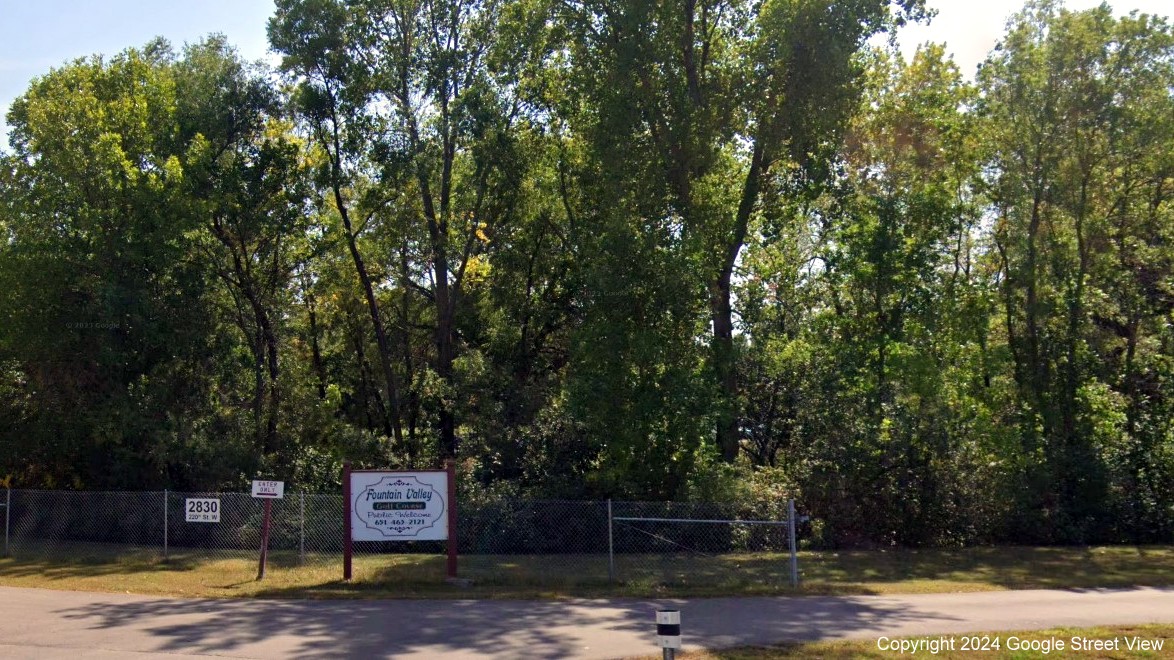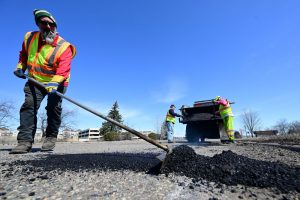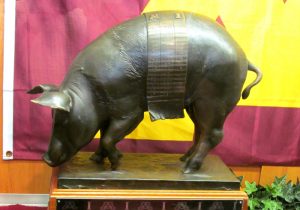
Some residents want to ‘keep the “farm” in Farmington’ as developer eyes golf course land for data center park
Up to a dozen data centers could be coming to Farmington, despite objections from some residents.
Nearly 343 Dakota County acres have caught the attention of Tract, a data center land acquisition and development company, to be the potential site of the Farmington Technology Park, but the project hinges on rezoning three parcels of land.
Based in Denver, Tract is looking at the Fountain Valley Golf Club property at 2830 W. 220th St. and two nearby properties that were recently annexed into the city of Farmington from Castle Rock Township and are now owned by Independent School District 192, according to city documents.
Tract, a data center developer, is interested in some 343 acres of land in Dakota County to construct the Farmington Technology Park, which could include up to 12 data centers. The Farmington City Council is expected to vote on a land rezoning that would move the project forward on Oct. 21, 2024. (Courtesy of Tract)
The parcels, located near the intersection of Minnesota 50/220th Street West and Minnesota 3/Chippendale Avenue West, are currently zoned as a mixture of agriculture, highway business, park/open space and low- and medium-density residential and would need to be rezoned as mixed-use commercial industrial for the project.
The current site plan, which is subject to change as an end-user has not been identified, includes up to 12 data center buildings spanning more than 2.5 million square feet and two administrative buildings, according to city documents.
The company expects to invest $50 million to $100 million to develop the infrastructure required for the technology park, said Graham Williams, chief investment officer for Tract, in a written statement. “We expect $5B+ to be invested into the data centers themselves as the sites are built out,” Williams added.
As for the golf course, which is owned by Carole and Bryce Olson, Williams said, “We found two willing sellers including the owners of the Fountain Valley Golf course who were open to a well-deserved retirement after operating the course for 40 years.”
Once the sites are built out, Williams said the Farmington Technology Park would add some 275 “high paying data center jobs” including IT engineers, security guards, electricians and technicians.
Tract, which is working with Dakota Electric and Great River Energy, identified the transmission lines running to the south of the site as the primary magnet for high tech development, Williams said. “The goal is to identify locations where buildings can be centered on a development site with appropriate buffers and setbacks to mitigate impacts on neighbors.”
As noted in the site plan, the applicant is proposing a 40-foot-wide buffer around most of the site’s perimeter “with the intent to retain as many of the existing trees as practical” as well as “a setback of at least 250 feet from all property lines” for the site’s buildings.
Unanimous vote despite concerns
The Farmington Planning Commission voted 5-0 last month to recommend the rezoning and preliminary plat to the Farmington City Council.
Residents who spoke at the Sept. 10 planning commission meeting raised a variety of concerns including the potential noise emitted from up to 12 data centers, the height of the buildings that would be constructed between two established neighborhoods and the end-user of the site abiding by the site plan that Tract and the city would agree to.
Related Articles
Working Strategies: Starting, and completing, your 12-week job search
3M spin-off Solventum clarifies location of proposed HQ on former Blue Cross campus in Eagan
U.S. adds a robust 254,000 jobs in Sept., unemployment dips to 4.1%
What to do with 2 million Marriott points? Get a Bellagio fountain show
A Donald Trump mass deportation of immigrants would cost hundreds of billions, report says
“A technology park data center on that property would drastically change the quality of life for hundreds of people who would live nearby,” said one Farmington resident who shares a property line with the proposed site.
“We are not objecting to a technology park in Farmington, we object to this location,” she added, echoing the concerns of other residents.
This particular area in Farmington has been looked at for potential data center development for a number of years due to the electrical infrastructure that is in place, said Deanna Kuennen, community and economic development director for Farmington, during a recent phone call with the Pioneer Press.
“Please do not feel sorry for Tract if they need to spend a few million dollars more to move this project to an area where they need to pull more power. Please feel sorry for us,” said Eszter Varga, who is an administrator of the Environmental Coalition of Farmington Minnesota Facebook group.
The group, which has nearly 100 members, “is a group for greater Farmington and Castle Rock residents concerned about the proposed technology park for data centers,” according to the page.
Cathy Johnson, a member of the coalition, spoke at length during the Sept. 10 meeting about the potential noise from the data centers. Johnson shared concerns about a constant “tonal noise” from the centers as well as the potential for traffic noise when delivery trucks bring equipment.
Planning commission member Dirk Rotty, who worked for Dakota Electric for nearly 40 years before retiring in 2018, said during the meeting that he visited Apple, Microsoft and Meta data centers in Waukee, Des Moines and Altoona, Iowa.
“We went to Des Moines,” Rotty said, where there is a 408,000-square-foot Microsoft data center. “We went there and we parked, there were some trees and I said, ‘When are we going to get there?’ We were there,” he said. “And we couldn’t hear anything through the trees.”
Jacob Steen, a shareholder with law firm Larkin Hoffman, which is representing Tract, said at the meeting that any future phase of the project would require a noise study which would consider the exact equipment that is being proposed.
Steen underscored that any noise would be within the legal limits and enforced by law enforcement as well as “contractually.”
“Maybe we should keep the ‘farm’ in Farmington,” one resident said to applause.
Next steps
Farmington planning manager Tony Wippler said the city council is expected to vote on the rezoning proposal at the upcoming Oct. 21 meeting.
Should the council approve the land rezoning, there are still many steps to be taken before construction could begin, Wippler emphasized in a recent phone call with the Pioneer Press.
Farmington is also working on its mid-cycle comprehensive plan amendment, which is expected to be approved by the end of the year.
As a result, the rezoning, preliminary plat and preliminary planned unit development are contingent on approval of the amendment.
Nearby data centers
Should it come to fruition, the Farmington Technology Park would join the likes of Meta, Facebook’s parent company, on the list of Dakota County data centers.
Meta announced earlier this year that it will open an $800 million data center just 15 miles north of the potential Farmington Technology Park in Rosemount.
Related Articles
Angie Craig, Joe Teirab spar on abortion, inflation, immigration in MPR debate
West St. Paul YMCA site eyed for mixed-use redevelopment
MN attorney general files fraud lawsuit against developer behind Lakeville housing project aimed at Somali-Americans
Haunted mazes, jack-o’-lantern festivals, fall arts: A roundup of Twin Cities Halloween events
Eagan City Council backs state assistance for Solventum, 3M’s health care spin-off, as it eyes BCBS site
Rosemount residents held similar concerns as Farmington residents including environmental issues like noise pollution and water usage, the cost of roads, streetlights and fire hydrants as well as qualms about Meta being the end-user of the data center.
Meta’s data center will span 700,000 square feet once it’s constructed on a 280-acre parcel of UMore Park.
Spanning some 4,772 acres, UMore Park was bought by the federal government in the 1940s to be used as a gunpowder manufacturing facility. After World War II, the land was given to the University of Minnesota and used as a research site.
The data center, which will help serve Meta’s needs for artificial intelligence computing power, is anticipated to bring in 1,000 construction jobs and support 100 positions in the long term.


